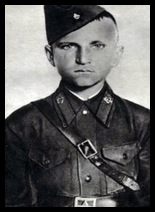
Petya Klypa


When the war broke out, Petya Klypa was in his fifteenth year. On June 21, 1941, Petya and his friend were watching a movie in the Brest Fortress. In the evening they decided to spend the night in the barracks, and in the morning they were going to go fishing …
The storming of the fortress began on June 22 at the third hour of the morning. Petya, who jumped out of bed, was thrown against the wall by the explosion. When he came to himself, the boy immediately grabbed a rifle and began to help the elders. In the next days of defense Petya, risking his life, went on reconnaissance, carried ammunition and medical supplies for the wounded.
Later Petya and his comrades managed to swim across the river under the crossfire of the Germans, but they were taken prisoner. He was driven into a column of prisoners of war, which was being taken away over the Bug. After a while a car with German newsreel cameramen appeared near the column. They were filming the bleeding, bloody captured soldiers, and suddenly a boy walking in the column shouted his fist directly into the camera lens…. Convoys beat Petya Klypa to a pulp.
Later the youth was loaded into railroad cars and sent to Germany for forced labor. So Petya Klypa became a laborer for a German peasant in Alsace. He was released from captivity in 1945.
In his small homeland Piotr Klypa took a criminal path: he was engaged in speculation and banditry. In May, 1949 Peter Klypa was sentenced to 25 years of imprisonment, but in 1955 he was released early. Pyotr Klypa’s military deeds were popularized among the people, and his name was often given to pioneer groups and squads.
Pyotr Sergeyevich Klypa died on December 16, 1983 in Bryansk, the cause of death was cancer.



